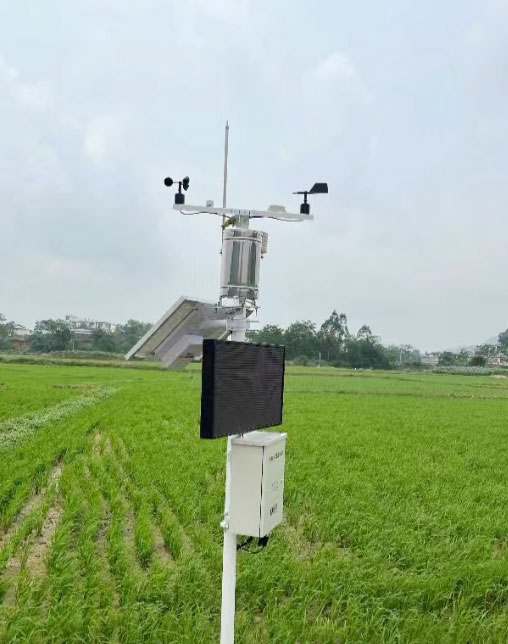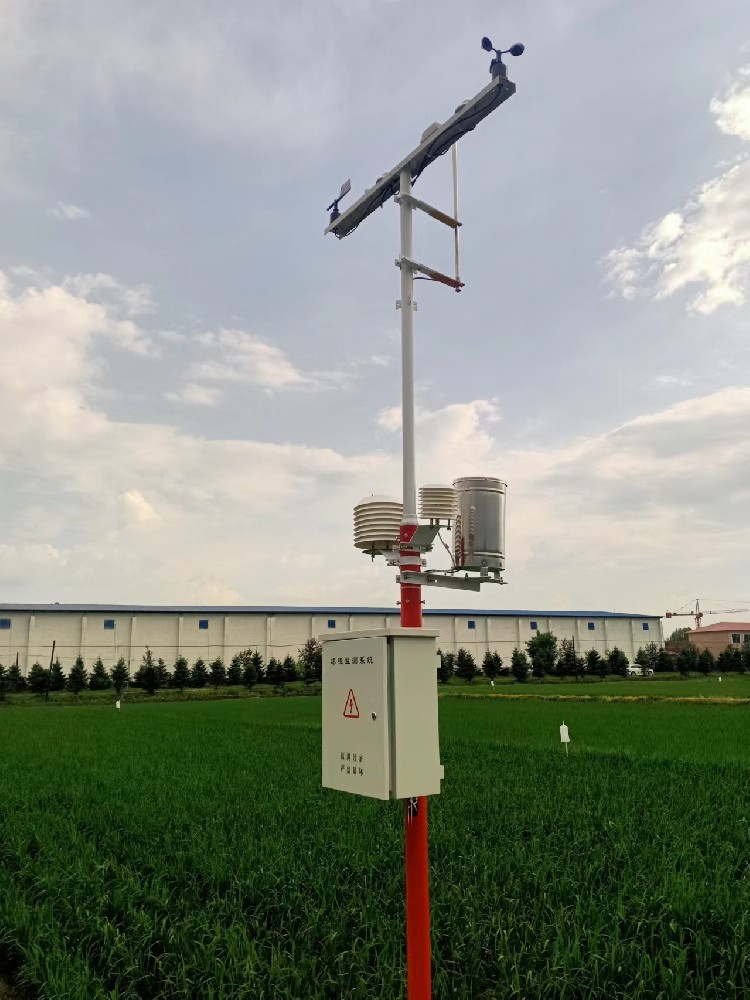

— Blogs —
—Products—
 Consumer hotline +8618073152920
Consumer hotline +8618073152920 WhatsApp:+8615367865107
Address:Room 102, District D, Houhu Industrial Park, Yuelu District, Changsha City, Hunan Province, China
Product knowledge
Time:2024-07-07 21:57:51 Popularity:1280
A weather station farm, also known as an agricultural weather station, is a collection of multiple weather stations distributed over a geographic area to provide detailed and localized weather data. These weather stations are typically used in an agricultural setting to monitor and record a variety of weather conditions that may affect crop growth, yield, and overall farm management.
Weather station farms are especially important in modern agriculture because they help farmers make informed decisions about planting times, irrigation, fertilizer application, pest control, and harvesting. The data collected from these stations can also be used for climate research, agronomic research, and the development of precision farming practices.
The following are some of the key aspects of weather station farms.
1. Types of sensors: Weather station farms consist of various types of sensors, including temperature sensors, humidity sensors, barometers to measure atmospheric pressure, anemometers to measure wind speed and direction, rain gauges, and sometimes even soil moisture sensors and solar radiation sensors.
2. Data collection: Data collected from these sensors are usually transferred to a centralized database or cloud-based platform for analysis and interpretation. These data can be accessed in real time or stored for historical analysis. 3.
3. Network management: Managing a network of weather stations requires robust communication protocols and data management systems to ensure the accuracy and reliability of the collected data.
4. Applications:Data from weather station farms are used for a variety of applications including crop planning, irrigation scheduling, frost warnings, disease prediction, and yield optimization.
5. Precision Agriculture:Weather Station Farms are the cornerstone of precision agriculture, using technology and data to optimize farm management practices. This improves efficiency, reduces environmental impact, and increases farmer profitability.
Overall, Weather Station Farm is an important tool for farmers looking to integrate science and technology into their farming practices, providing them with the information they need to make informed decisions that lead to better crop yields and more sustainable farming methods.
Weather Station Farm, or Farm Weather Station, is an online monitoring device used to monitor agro-meteorological data. It mainly consists of moisture monitoring sensors, collectors, communication modules (e.g. RS485 or 4G, 5G, etc.), power supply system, and stand. This kind of equipment plays an important role in the field of intelligent agriculture, and its main functions and values are reflected in the following aspects:
Weather Station Farm Role
1. Real-time monitoring of meteorological data: Weather Station Farm is able to monitor and record various meteorological data in the farmland in real time, including soil temperature and humidity, soil pH, electrical conductivity, soil water potential, soil heat flux, air temperature and humidity, wind speed, wind direction, atmospheric pressure, rainfall and so on.
2. Environmental improvement guidance: By scientifically analyzing these environmental factors, farmers can understand the environmental needs of crop growth and take appropriate measures to improve the environment, thereby promoting crop growth and development.
3. Remote monitoring and management: Weather Station supports remote online monitoring, farmers can log in to the cloud platform at any time to view and export weather data to realize remote monitoring and management.
Weather Station Farm Value
1. Improve agricultural production efficiency: Through real-time monitoring and data analysis, farmers can manage agricultural production more accurately, reduce production losses due to environmental factors, and improve agricultural production efficiency.
2. Promote sustainable development of agriculture: The data support from the weather station helps farmers better understand the farmland environment, adopt scientific and reasonable agricultural production methods, reduce damage to the environment, and promote sustainable development of agriculture.
3. Reduce production costs: Through accurate agricultural production and management, farmers can reduce unnecessary inputs, lower production costs and improve economic efficiency.

Advantages of Weather Station Farm
1. Real-time monitoring and high precision:
Weather Station Farm is able to monitor a variety of meteorological data in real time, including soil temperature and humidity, air temperature and humidity, wind speed, wind direction, rainfall, etc. It is characterized by high accuracy and precision, and can provide timely and accurate meteorological information for agricultural production.
2. Portability and flexibility:
The portable weather station is designed to be lightweight and portable, and can be easily deployed to different farmland areas for monitoring. Meanwhile, it supports a variety of communication methods, such as RS232, RS485, 4G, etc., which is convenient for data transmission and download.
3.Multi-parameter measurement:
Weather Station Farm is able to synchronize the measurement of multiple meteorological parameters, such as soil temperature and humidity, salinity, conductivity, etc., which provides comprehensive meteorological and environmental data support for agricultural production.
4.Data sharing and remote monitoring:
The weather station supports the transmission of real-time collected weather data to the cloud or other devices to realize data sharing and remote monitoring, which is convenient for users to view and manage at any time.
5. Green energy-saving design:
Part of the weather station adopts low power consumption design and supports solar power supply, which is suitable for long-term use in areas without electricity or unstable power, both energy-saving and environmentally friendly.
6. Wide range of application scenarios:
Weather Station is not only suitable for agricultural production, but also can be widely used in meteorological observation, environmental control, factories and many other fields, with a wide range of application prospects.

Weather Station Farm Disadvantages
1. Signal stability problems:
Wireless weather station has the problem of signal instability, which is affected by weather, terrain and other conditions. If the signal is not stable, it may lead to inaccurate data or unable to transmit.
2. Limited storage capacity:
Weather stations generally have a fixed storage capacity, when the data exceeds the storage capacity, the data needs to be manually emptied, otherwise it will lead to data loss. This may affect the integrity of the data and the continuity of long-term monitoring.
3. Susceptible to interference:
The weather station may be interfered by other wireless signals during use, which may affect the stability and accuracy of the data.
4. equipment failure and maintenance:
Weather stations rely on complex electronic technology and software programs, and once a failure occurs, it is difficult to repair and may lead to data loss or abnormality. In addition, regular maintenance and upkeep of equipment is essential, which may increase certain costs and workload.
Summary
Weather Station Farm, as an advanced agro-meteorological monitoring device, plays an important role in the field of smart agriculture. It can not only help farmers monitor various meteorological data in the farmland in real time, but also provide scientific guidance for agricultural production through data analysis, and promote the improvement of agricultural production efficiency and sustainable development of agriculture. With the continuous development of science and technology, the application of weather stations in the field of agriculture will become more and more extensive, bringing more convenience and benefits to agricultural production.
Related recommendations
Sensors & Weather Stations Catalog
Agriculture Sensors and Weather Stations Catalog-NiuBoL.pdf
Weather Stations Catalog-NiuBoL.pdf
Related products
 Combined air temperature and relative humidity sensor
Combined air temperature and relative humidity sensor Soil Moisture Temperature sensor for irrigation
Soil Moisture Temperature sensor for irrigation Soil pH sensor RS485 soil Testing instrument soil ph meter for agriculture
Soil pH sensor RS485 soil Testing instrument soil ph meter for agriculture Wind Speed sensor Output Modbus/RS485/Analog/0-5V/4-20mA
Wind Speed sensor Output Modbus/RS485/Analog/0-5V/4-20mA Tipping bucket rain gauge for weather monitoring auto rainfall sensor RS485/Outdoor/stainless steel
Tipping bucket rain gauge for weather monitoring auto rainfall sensor RS485/Outdoor/stainless steel Pyranometer Solar Radiation Sensor 4-20mA/RS485
Pyranometer Solar Radiation Sensor 4-20mA/RS485
Screenshot, WhatsApp to identify the QR code
WhatsApp number:+8615367865107
(Click on WhatsApp to copy and add friends)
